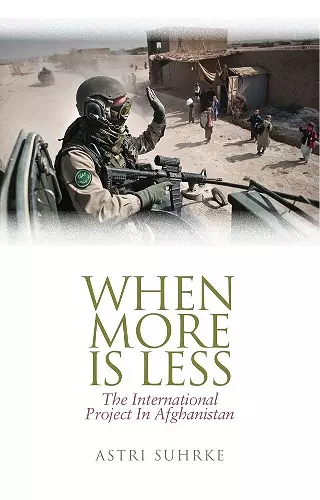When More is Less
The International Project in Afghanistan
Format:Hardback
Publisher:C Hurst & Co Publishers Ltd
Published:28th Nov '11
Currently unavailable, and unfortunately no date known when it will be back

The Western-led efforts to establish a new post-Taliban order in Afghanistan are in serious trouble, and in this book Suhrke sets out to explain why. She begins with the dynamic of the intervention and its related peace-building mission. What were the forces shaping this grand international project? What explains the apparent systemic bias towards a deeper and broader international involvement? Many reasons have been cited for its limited achievements and ever-growing difficulties, the most common explanation being that the national, regional, and international contexts were unfavourable. But many policies were misguided while the multinational operation itself was extraordinarily and unnecessarily complex. Astri Suhrke's main thesis is that the international project itself contains serious tensions and contradictions that significantly contributed to the lack of progress. As a result, the deepening involvement proved dysfunctional: massive international support has created an extreme version of a rentier state that is predictably weak, corrupt and unaccountable; US-led military operations undercut the peacebuilding agenda, and more international aid and monitoring to correct the problems generate Afghan resentment and evasion. Continuing these policies will only reinforce the dynamic. The alternative is a less intrusive international presence, a longer time-frame for reconstruction and change, and negotiations with the militants that can end the war and permit a more Afghan-directed order to emerge.
'Astri Suhrke has produced a brilliant expose of the failure of international efforts to construct a stable post-Taliban order in Afghanistan. Her analysis is to the point and very balanced, and her conclusions very instructive. She tells us very convincingly why and where the international involvement has gone wrong, and what would be an appropriate strategy for the international community to adopt. Her book deserves to be read as widely as possible.' * Amin Saikal, Professor of Political Science and Director of the Centre for Arab and Islamic Studies, Australian National University *
'When More is Less is a timely, lively, and dispassionate investigation into the causes and consequences of the disappointing modern history of peacebuilding in Afghanistan. As someone who has been involved with Afghanistan for over two decades, and has studied various UN interventions in places like Kosovo and Rwanda, Astri Suhrke is well positioned to use her tremendous knowledge to sort through these critical issues - and suggest not only how things might have been different in Afghanistan, but also how things can be different the next time the international community undertakes a peacebuilding project.' * Michael Barnett, University Professor of International Affairs and Political Science, George Washington University *
'The failure of the international coalition in Afghanistan is a major event that we still have to cope with. Astri Suhrke's book is a first solid step towards understanding the internal contradiction between the liberal project of the "international community" and the rational of the U.S. military on the ground.' * Gilles Dorronsoro, visiting scholar at the Carnegie Endowment for International Peace *
'In this exhaustively researched book, Astri Suhrke provides a trenchant and persuasive account of the evolution of Western peace-building and state-building in Afghanistan since 2001, and of the dynamic of deepening engagement in the face of disappointing results. It is essential reading for scholars, foreign and defence policy practitioners, and the informed public.' * S. N. MacFarlane, Lester B. Pearson Professor of International Relations Oxford University *
'Astri Suhrke's book contains the pithiest description I know of where Afghanistan will be in 2014 - - if the self-deceiving spin of progress underway continues - - "a large number of men with arms, but weak institutions". She dissects, with an unblinking eye, how we got there, thanks to the stifling "military embrace" of Operation Afghanistan.' * Thomas Ruttig, Co-Director of the Afghanistan Analysts Network, an independent Kabul-based think-tank *
ISBN: 9781849041645
Dimensions: unknown
Weight: unknown
256 pages